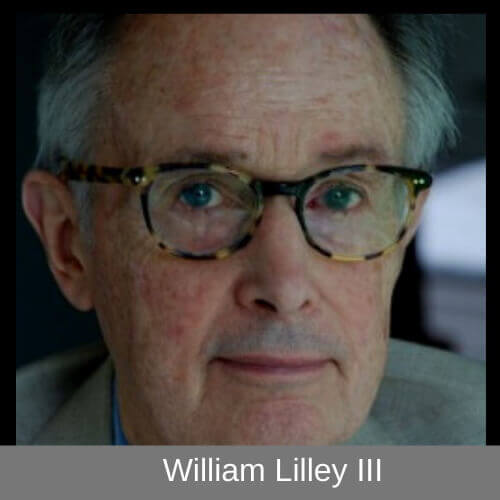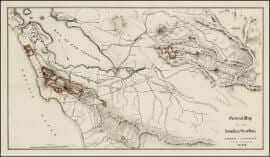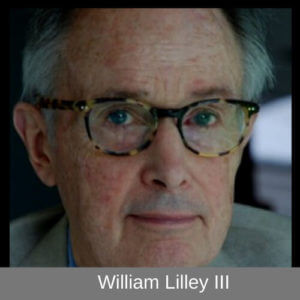
William Lilley III Ep. 67 - "Bill Lilley taught at Yale, worked for the federal government, worked at CBS in New York, and started a software company, which he sold," said John Fox Sullivan, longtime friend and former Yale student." Meet William "Bill" Lilley III, an American Western History Buff, who taught at Yale where he received his Ph.D. for most of the 1960s with American history and American studies as his fields. He worked in the federal government in all of the 1970s where he was deputy assistant secretary at HUD. He then worked as the acting director of the U.S. Council on Wage & Price Stability and later as Staff Director of the Budget Committee of the U.S. House of Representatives. Bill also worked in the private sector for CBS Inc., the media company in New York, where he was Senior Vice President of Corporate Affairs for seven years. He then left CBS to found his own company called iMapData which built an extensive library of databases that could be visualized on a web-based platform.
Top Takeaways:
- Understanding the troubles of HUD in the 1970s and the measures that were taken to curb them
- How the tax force was used to eliminate housing troubles and instead establish programs that ensured affordable housing for all income levels
- The importance of digitization of data in urban development
Listen in to learn how HUD troubles in the 1970s threatened quality and affordable housing for all people.
"Don't listen to the media, the people that are working in the media don't know anything more than you do and they know very little about the economy and how it works." -William Lilley III
Multi-Faceted Career
William Lilley III is co-founder and chairman of iMapData Inc., an information company that delivers globally-based geo-spatial intelligence on a web-based platform enabling users to visualize data and create maps and reports by accessing and merging databases on socio-demographics, physical infrastructure, institutional infrastructure (schools, universities, places of worship, police stations, fire stations, etc.), political boundaries. elected officials, taxes, regulations, businesses, jobs, and specific industry data. Lilley has made iMapData available to the Center for scholars and students to work on multiple issues involving the American West-e.g., measuring water availability and usage in California, analyzing where the West is rich and where it is poor, and measuring different ways that the rural American West has changed over the last century.
Lilley's initial interest in the West came from his Yale academic work, especially his PhD dissertation which focused on economic and political development in California and Nevada in the late 19th century. Lilley subsequently taught American history at Yale for eight years and then left academia for several different careers. First Lilley worked in the government, as Deputy Assistant Secretary of the U.S. Department of Housing & Urban Development, then as Director of the U.S. Council on Wage & Price Stability, and then as Staff Director of the Budget Committee of the U.S. House of Representatives. Lilley left government to work in the private sector for CBS Inc., the media company in New York, where he was Senior Vice President of Corporate Affairs for seven years.
AUTHOR
Lilley also has published extensively, mostly during his years at Yale and at iMapData. His writings have focused on how government policies affect local economic activity, on the economics of professional sports businesses and on the socio-economic makeup of U.S. state and local political jurisdictions.
 Lilley's book, Francis Newlands and the Improbable Quest to Irrigate the West, was published in 2020 by Stanford's Bill Lane Center for the American West. David M. Kennedy, history professor emeritus at Stanford, directed Lilley's work on the Newlands biography. "The modern West is literally inconceivable without the hugely ambitious irrigation projects that Francis Newlands set in motion," said Kennedy who had founded the Bill Lane Center in 2005.
Lilley's book, Francis Newlands and the Improbable Quest to Irrigate the West, was published in 2020 by Stanford's Bill Lane Center for the American West. David M. Kennedy, history professor emeritus at Stanford, directed Lilley's work on the Newlands biography. "The modern West is literally inconceivable without the hugely ambitious irrigation projects that Francis Newlands set in motion," said Kennedy who had founded the Bill Lane Center in 2005.
You will also learn why you should turn away from the media as a young person, as advised by
Key Moments:
Bill explains his interest in policy development away from the teaching path he had first chosen for himself [2:57]
He names the people he admired and worked with at HUD from the housing sector and other programs [5:20]
He explains the troubles that met HUD in the early 1970s and how they threatened the organization and its programs [7:02]
How public housing designs got out of control and became more problematic for the population than they were helpful in the 70s [15:17]
How Section 8 came about to provide affordable housing and successful housing to eliminate housing troubles [17:22]
How Operation Breakthrough helped families to get better, safe, and secure affordable housing [21:09]
Bill describes his role as the Acting Director of the U.S. Council on Wage & Price Stability and the Staff Director of the Budget Committee of the House of Representatives [23:18]
Why Bill left the government to go to a high level and a more interesting job at CBS [27:19]
Why the cyberspace became a place of interest for Bill which prompted him to start his company iMapData [29:30]
Bill talks about the National Journal and how he was inspired to write his new book [32:34]
Bill advises young people to study and not to listen to the media [34:57]
